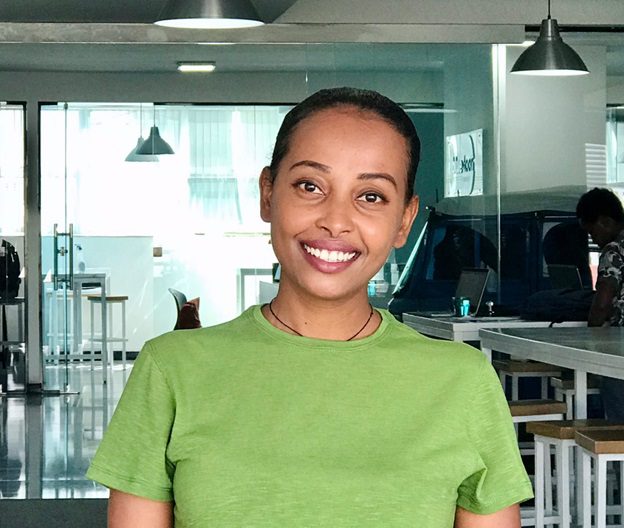
“Did you know that there are plantable paper bags? The co-founder and CEO of Plantable Bags, RedietTadesse is developing an economically viable business while contributing to Ethiopia’s green economy by making eco-friendly paper bags available in the Ethiopian market, tweeted Australian Embassy, Ethiopia following its Social Enterprise Challenge program.
True,‘plantable paper bag’is not a familiar thing for many people, especially the word plantable.Eventhough we are well-acquainted with the bags made of papers and use them in our day to day activities to carry our belongings, many of us are heedless as those plantable carry bags has a slice of nature in them; and are eco-friendly.
Needless to say that in most cases, people prefer to use plastic carry bags because it is an inexpensive and easily available product. However, as studies indicate, its ill effects, compared to bags made of papers, are very damaging to the environment for the reason they are non-compostable and non-biodegradable in nature.
This means that once they are created, they will always be present on the surface of the earth, continuing to serve as waste and releasing harmful toxins. Once these plastic bags are used, they enter into landfills. As each year goes by, more and more bags are ending up littering the natural environment. Once they become litter and waste, plastic bags find their way into our water bodies, beaches, and streets. And, if these non-biodegradable plastic bags are burned, they infuse the air with toxic fumes, studies indicate.
These catastrophic plastic bags are not only having negative effects on the environment but also affecting the lives of the wildlife on our planet.
Experts say that about 100,000 animals, such as dolphins, turtles, whales, penguins are killed each year as a consequence of plastic bags. All of these animals ingest plastic bags, mistaking them for food, which instantly kills them.
What’s even worse is that these ingested plastic bags remain intact, as they are, even after the death and decomposition of the bodies of the animal. The decomposition of the plastic bags takes as long as 400 years. Thus, these bags lie around and stay in the lands. This also increases the risk of another animal consuming the same plastic bag.
Thus, plastic bags are the most harmful and destructive materials of carry bag that prevail life-long.
And that is why RedietTadesse, the co-founder and CEO of Plantable Bags, dare to fight the global challenge; climate change, cut down the use of plasticbags through her innovation-producing eco-friendly paper bags made from recycled paper and seedlings of fruits and vegetables.
Redietwas born and raised in Hawassa City along with her three sisters. Growing up in her extended family, she and her sisters was obliged to protect and take good care of the fruits and vegetables planted in their backyard. An Architect by profession, Rediet was very attached to nature and concerned by climate change.
In 2018, she accidentally heard a report that placed the city of Addis Ababa amongst the highly risked citiesowing to climate change. Given her attachment to nature and environment, she could not let go the report easily, thus, she started looking for a way to do her part to alleviate the challenge.
A year later she heard the report andgoing through a certain video that produce reusable materials,she came up with an idea of producing plantable paper bags
Since she realized that excessive use of plastic bags were the major causes behind the challenge of climate change in the capital, she decided to produce a paper bag that can be planted after it served its purpose.
Fortunately, she was able to produce paper bags which can be planted in backyard to grow fruits and vegetables.
She said: “Most of us are aware that people throw plastic bags on the street with no concern. However, our plantable bags will play a positive role in creating a healthier environment after they have served their original purpose.”
Though her plan was to produce using machineries, the fact that they did not have enough capital, they are producing the bags renting a machine.
She indicated that they use recycled paper, carrot and tomato seedlings and glue to prepare the paperbagsthough they have a plan to use other seedling in the future.Apart from preparing the bags entirely from paper, they use chemicals that are less harmful to the soil and the seedlings to make the items more attractive and desirable for customers.
Moreover, she noted that they are highly committed to make the paper bags reusable just like the plastic bags are used and want to minimize excessive use.
“We are discussing ways with the Ethiopian Seed Association on how to use different seedlings as we plan to produce bags made from various fruits and vegetable and provide customers with variety”, she underscored.
Since challenges are inevitable in business world, Rediet has been encountered with different obstacles through the process of making her business a reality. One of the challenges, as to her, was society’s poor understanding towards the impact of plastic bags with regard to climate change.
Not only the big awareness gap in the society affects the climate change; but it has become bottleneck in the business as it made it difficult to become competitive in the sector, she stressed.
Though her plan is to provide the bags on affordable price for the society, the fact that plastic bags are available nearly free in the day to day business, it gives them a hard time to be competent in the market.
Similarly, even thoughthe country enacted law against plastic bags aimed at reducing the impacts of plastic productson the environment, failure to implement the law accordinglyis affecting the environment as well as the business, according to her.
BY BETELHEM BEDLU
THE ETHIOPIAN HERALD THURSDAY 9 JUNE 2022





